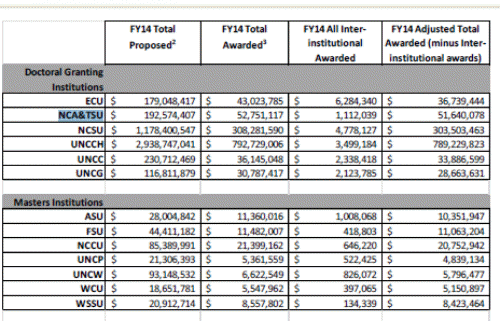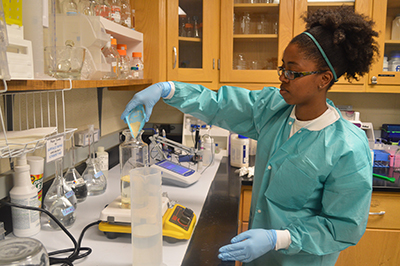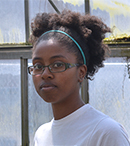| N.C. A&T to Lead $5 Million Project on
Unmanned Vehicles David Arneke A $5 million grant from the U.S. Air Force will fund a research team led by North Carolina A&T State University that will develop control systems for a new dimension in battlefield strategy: large teams of unmanned vehicles. The five-year project will expand the use of autonomous vehicles, such as drones, to a larger and more diverse scale. The vision is to manage future battlefields with autonomous vehicles working together in the air, on the ground and/or underwater. The vehicles could be controlled remotely by human operators or they could maneuver autonomously in complex environments. Teams of autonomous vehicles working in concert with soldiers, sailors and fliers would be capable of a variety of cooperative missions, such as surveillance and reconnaissance. |
 |
|
FY141 Sponsored Program Funding for UNC |
The funding will allow A&T to establish a multi-disciplinary Center for Testing, Evaluation and Control of Heterogeneous Large-Scale Autonomous Vehicles. A&T’s partners on the project will be the University of Texas at San Antonio and Southwestern Indian Polytechnic Institute, a national tribal community college, in Albuquerque, New Mexico. The project will build on the team’s years of research in robotics, control, machine learning and expert systems. It will focus on three related areas:
•Modeling, analysis and control of autonomous vehicles, led by Dr. Mo Jamshidi of UTSA
•Resilient control and communication for large-scale systems of autonomous vehicles, led by Dr. Ali Karimoddini of A&T
•Testing, evaluation and verification, led by Dr. Younho Seong of A&T
The results will be integrated by Dr. Fatemeh Afghah at A&T. In addition, the team will develop an education and outreach program to bring the team’s work to the classroom and to foster public awareness. Dr. John Kelly of A&T and Dr. Nader Vadiee of Southwestern Indian Polytechnic Institute will lead that work. Vadiee is project director for the college’s NASA Tribal College and University Experiential Learning Opportunities program.
Applications of the team’s technology won’t be limited to the military. “The results can be extended to other classes of systems of systems such as smart grids, transportation systems, air-traffic control systems, and more,” Homaifar says.
David Arneke

 Celena
Alford of North Carolina A&T State University has been awarded a Fulbright
Study/Research Grant to the Philippines for the 2015‐16 academic year.
Alford is a senior biological engineering major from Greensboro. She
will conduct research on conservation agriculture and soil quality at the
University of the Philippines-Los Banos, a connection facilitated by Dr.
Manuel Reyes of the Department of Natural Resources and Environmental Design
at N.C. A&T. Alford has taken part in several undergraduate research
projects, including one with the Organization for Tropical Studies in
Sarapiqui, Costa Rica, where she studied the mutually beneficial activities
and relationships between ants and plants. At A&T, she has served as the
secretary for the American Association of Biological Engineers chapter and
has conducted research in the biological engineering program. She is also a
recipient of the Dowdy Scholarship. After the completion of her Fulbright
grant, Alford plans to pursue a master’s degree in biological engineering,
with an ultimate goal of working with water resources and agricultural in
developing countries.
Celena
Alford of North Carolina A&T State University has been awarded a Fulbright
Study/Research Grant to the Philippines for the 2015‐16 academic year.
Alford is a senior biological engineering major from Greensboro. She
will conduct research on conservation agriculture and soil quality at the
University of the Philippines-Los Banos, a connection facilitated by Dr.
Manuel Reyes of the Department of Natural Resources and Environmental Design
at N.C. A&T. Alford has taken part in several undergraduate research
projects, including one with the Organization for Tropical Studies in
Sarapiqui, Costa Rica, where she studied the mutually beneficial activities
and relationships between ants and plants. At A&T, she has served as the
secretary for the American Association of Biological Engineers chapter and
has conducted research in the biological engineering program. She is also a
recipient of the Dowdy Scholarship. After the completion of her Fulbright
grant, Alford plans to pursue a master’s degree in biological engineering,
with an ultimate goal of working with water resources and agricultural in
developing countries.
"Earning this Fulbright Grant award is an outstanding achievement,” said Dr. Robin Coger, dean of the College of Engineering. “Celena’s commitment to using her knowledge as an engineer to make a global impact exemplifies the well-rounded, high-achieving leaders that our university is dedicated to producing.” The Fulbright Program is the flagship international educational exchange program sponsored by the U.S. government. It is designed to increase mutual understanding between the people of the United States and the people of other countries. Recipients of Fulbright grants are selected on the basis of academic or professional achievement, as well as demonstrated leadership potential in their fields. The program operates in over 155 countries worldwide.